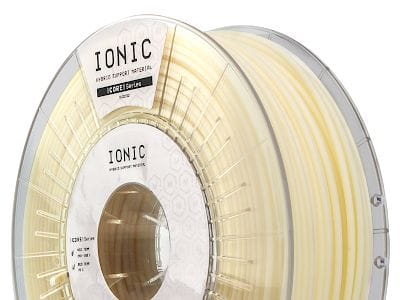![Ionic Hybrid Support 3D Printing Material [Source: MatterhHackers]](https://fabbaloo.com/wp-content/uploads/2020/05/ionic-support-material_img_5eb0914ce9183.jpg)
MatterHackers announced a rather interesting support material that could solve many 3D printing challenges.
The new material, Ionic Hybrid Support, seems to have the best characteristics of several other types of support material. This should enable it to be used in a wide variety of 3D printing scenarios.
Ionic Hybrid Support Material
But what’s the issue being solved here? Isn’t support material pretty much the same?
Not really. While support material originally emerged in desktop 3D printers as simply printing more of the original model material, operators soon realized two major challenges.
3D Printer Support Material Problems
First, there is the possibility that support material might have to be placed in inaccessible regions of the object, depending on the model geometry. This meant that there was a class of geometries that simply could not be 3D printed: support material could not be removed.
A second problem was that of fragility. Support materials tend to stick to the actual model, and if you have to remove support structures from a spindly portion of the model’s geometry, you have a severe risk of breaking that fragile element and having to print the entire thing over again. That’s not cool.
These were eventually solved by the introduction of two different kinds of support material. Soluble support materials are able to dissolve, meaning one could then place support structures anywhere without fear of them being trapped. This enabled the easy 3D printing of virtually any geometry.
Breakaway Support Concept
The second development was what’s known as “breakaway” support material. These substances would provide a true support for material above, which would rest on them via gravity. They would only minimally — or not at all — bond chemically to the print itself, making it relatively easy to pull off the supports by hand after printing.
![Breakaway support structures [Source: MatterHackers]](https://fabbaloo.com/wp-content/uploads/2020/05/image-asset_img_5eb0914d4904b.jpg)
If this sounds like all problems were solved, they weren’t.
Dissolving soluble supports sounds good until you realize it can take hours and hours to do. Breakaway supports can be removed far faster, but then they cannot be used in just any geometry. Even worse, some soluble supports are only dissolvable in corrosive liquids that require special disposal procedures.
High-Temperature Support Materials
There’s another issue. Typical soluble supports have a relatively low melt temperature. While they are usually fine for common 3D printing materials such as PLA, ABS and PETG, they are less suitable for more advanced materials that happen to print at higher temperatures. In other words, it’s tricky to mix materials with widely differing operational temperatures during printing.
These seem to be the driving forces behind MatterHackers’ introduction of their new Ionic Hybrid Support 3D Printing Material. It seems to have the best characteristics of both types of support.
It is soluble — in plain tap water — making it able to be used with any 3D model’s geometry.
But at the same time it is a breakaway material, meaning you can snap off large chunks of support material by hand immediately, thus significantly reducing the dissolve time by reducing support material volume.
![3D prints with soluble support structures [Source: MatterHackers]](https://fabbaloo.com/wp-content/uploads/2020/05/image-asset_img_5eb0914db9326.jpg)
Ionic Hybrid Support Temperature
The Ionic Hybrid Support material also has a higher operating temperature, up to 250C. This makes it ideal for use with higher-temperature materials such as Nylon. In fact, MatterHackers says:
“Ionic is a support material formulated to pair with advanced materials like NylonX and NylonG so you can print more complex and functional parts in stronger materials. Ionic is both water-soluble and breakaway support material — this reduces post-processing time so your end-use parts can be applied to projects faster. Ionic’s thermal stability makes it compatible with a variety of advanced materials, including Nylon and ABS. You can now create stronger and more intricate 3D printed parts.”
At the same time, this material can also be used easily with lower-temperature common 3D printing materials such as PLA and ABS. If there is one support material that might be close to “universal” status, this could be it.
Ionic Hybrid Support Price
There’s only one issue with this wonder material: the price. At MatterHackers they’ve set the price for a 750g spool at US$120, or about US$160/kg. MatterHacker’s NylonX material, which is a very strong blend of nylon and carbon fiber segments, is priced at US$58 per 750g spool, less than half the price of the Ionic Hybrid support material.
Nevertheless, professionals seeking high-quality, high-temperature complex 3D prints might consider trying the Ionic Hybrid support material as it could be the only way to properly print some geometries in nylon material.
Via MatterHackers











An inventive designer has developed a method for producing 3D paper objects using recycled paper and 3D printed molds.